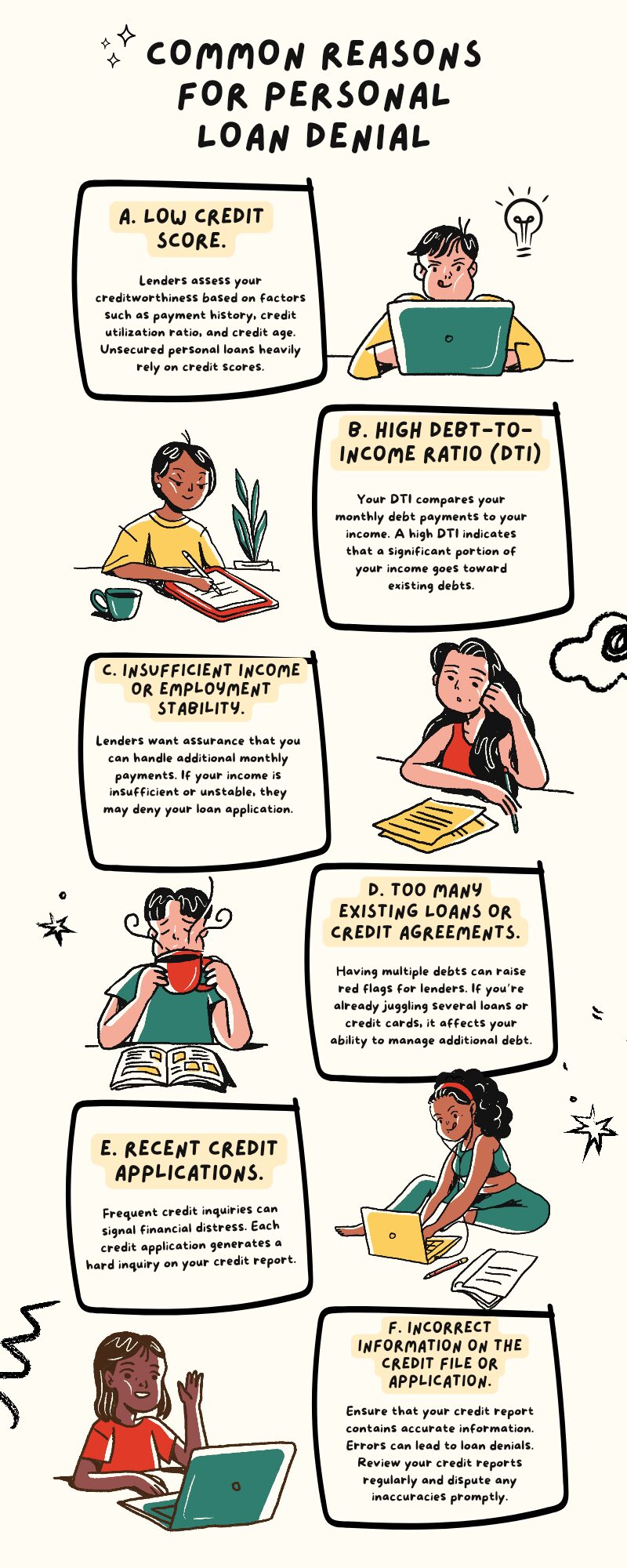Why Can’t I Get a Personal Loan? Personal loans serve as a financial lifeline for many individuals. Whether you need to consolidate debt, cover medical expenses, or finance a major purchase, a personal loan can provide

Why Can’t I Get a Personal Loan?
However, it can be disheartening when your loan application is denied. In this article, we’ll explore the reasons behind personal loan denials and offer actionable steps to enhance your chances of approval.
The Importance of Personal Loans
Personal loans are unsecured loans that don’t require collateral. They offer flexibility and can be used for various purposes. When you apply for a personal loan, you expect a straightforward process, but sometimes the outcome isn’t what you hoped for. Let’s delve into the common reasons why I can’t get a personal loan.

Common Reasons for Personal Loan Denial
a. Low credit score.
Your credit score plays a pivotal role in loan approval. Lenders assess your creditworthiness based on factors such as payment history, credit utilization ratio, and credit age. Unsecured personal loans heavily rely on credit scores. If your score is too low, lenders may hesitate to approve your application. Research lenders’ minimum credit score requirements before applying.
b. High Debt-to-income Ratio (DTI)
Your DTI compares your monthly debt payments to your income. A high DTI indicates that a significant portion of your income goes toward existing debts. Lenders prefer borrowers with a lower DTI, as it reflects better financial stability. Calculate your DTI (total monthly debt payments divided by gross monthly income) and work on reducing it.
c. insufficient income or employment stability.
Lenders want assurance that you can handle additional monthly payments. If your income is insufficient or unstable, they may deny your loan application. Stable employment and a consistent income stream improve your chances.
d. Too Many Existing Loans or Credit Agreements.
Having multiple debts can raise red flags for lenders. If you’re already juggling several loans or credit cards, it affects your ability to manage additional debt. Consider paying down existing loans before applying for a new one.
e. Recent credit applications.
Frequent credit inquiries can signal financial distress. Each credit application generates a hard inquiry on your credit report. Space out loan applications to avoid appearing desperate for credit.
f. Incorrect information on the credit file or application.
Ensure that your credit report contains accurate information. Errors can lead to loan denials. Review your credit reports regularly and dispute any inaccuracies promptly.
Steps to Improve Your Chances
a. Build your credit score.
- Check Your Credit Report: Obtain free copies of your credit reports from major credit bureaus. Look for errors and dispute them.
- Timely Payments: Pay bills on time to boost your credit score.
- Credit Utilization: Keep credit card balances low to improve your utilization ratio.
b. Reduce debt and improve DTI.
- Pay Down Existing Debts: Prioritize high-interest debts.
- Increase Income: Explore side gigs or part-time work to enhance your income.
c. Choose the right lender.
- Research Criteria: Understand each lender’s requirements.
- Alternative Financing: Consider credit unions or online lenders if traditional banks deny your application.
d. Address specific issues.
- Employment Stability: If your job history is inconsistent, focus on building stability.
- Other Denial Reasons: Address any specific issues highlighted during the denial process.
Understanding why your personal loan application was denied is the first step toward improvement. Take proactive measures to enhance your creditworthiness and financial stability. Persistence and informed action can significantly increase your chances of securing that much-needed personal loan.
Frequently Asked Questions (FAQs) About Personal Loan Denials
1. Why was my personal loan application denied?
Several factors can lead to a personal loan denial. Common reasons include:
- Low Credit Score: Lenders often use credit scores to assess your creditworthiness. If your score is too low, it may result in denial.
- High Debt-to-income Ratio (DTI): A high DTI indicates that a significant portion of your income goes toward existing debts.
- Insufficient Income or Employment Stability: Lenders want assurance that you can handle additional monthly payments.
- Too Many Existing Loans or Credit Agreements: Multiple debts can affect your eligibility.
- Recent Credit Applications: Frequent credit inquiries can raise concerns.
- Incorrect information on the credit file or application: Ensure your credit report is accurate.
2. How can I improve my chances of loan approval?
Consider the following steps:
- Build Your Credit Score:
- Check your credit report for errors, and dispute them.
- Make timely payments and maintain a low credit utilization ratio.
- Reduce debt and improve DTI:
- Pay down existing debts.
- Explore ways to increase your income.
- Choose the right lender.
- Research lenders’ criteria and consider alternative financing options.
- Address specific issues:
- Focus on stability if the employment history is inconsistent.
- Correct any specific issues highlighted during the denial process.
3. Can I still get a loan with bad credit?
While it’s challenging, options exist:
- Secured Loans: Use collateral (e.g., a car or savings account) to secure the loan.
- Cosigner: Find a cosigner with good credit to strengthen your application.
- Alternative Lenders: Some specialize in lending to individuals with poor credit.
4. How long should I wait before reapplying after a denial?
Space out loan applications to avoid frequent credit inquiries. Waiting a few months allows time to improve your credit and address any issues.
5. Should I apply with multiple lenders simultaneously?
Avoid applying to too many lenders at once. Each application generates a hard inquiry, which can negatively impact your credit score. Research lenders and apply selectively.
Remember, understanding denial reasons and taking proactive steps can enhance your chances of securing a personal loan.